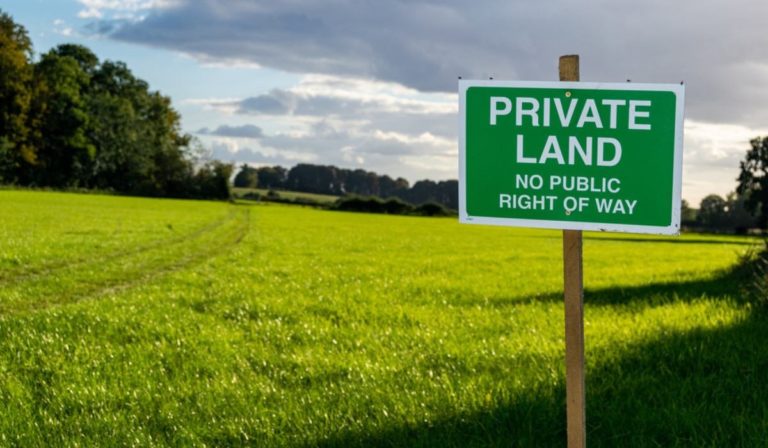As more individuals and families opt for off-grid living, they may encounter unique challenges when it comes to managing their property tax obligations.
Unlike traditional homes with municipal services like water, sewage, and trash pickup, off-grid properties often lack these basic amenities and can result in lower assessments from local governments.
However, this doesn’t necessarily mean that property owners won’t be required to pay taxes; quite the contrary, as they may still need to foot the bill for essential services such as road maintenance and emergency response.
We’ll explore the ins and outs of navigating property taxes in off-grid living so you can make informed decisions about your off-the-grid lifestyle while staying on solid legal ground.
Research the laws and regulations
Understand the property tax laws and regulations in your area, including any exemptions or deductions that may be available for off-grid properties.
These laws and regulations can vary significantly from one jurisdiction to another, and failure to comply can result in costly penalties and fees.
Therefore, it is important to research and understand any exemptions or deductions that may be available for off-grid properties.
In many areas, off-grid properties are eligible for special tax exemptions or deductions that can significantly reduce their property tax liability.
For example, some jurisdictions offer exemptions for renewable energy systems, such as solar panels or wind turbines, that are used to power an off-grid property.
Some areas may offer deductions for the cost of maintaining private roads or other infrastructure on the property.
To take advantage of these exemptions and deductions, it is essential to carefully document any improvements made to the property, such as the installation of renewable energy systems or the construction of private roads.
This documentation can be used to support your tax exemption or deduction claims and can help you avoid any potential disputes with the tax authorities.
Understanding the property tax laws and regulations in your area, including any exemptions or deductions available for off-grid properties, is a critical aspect of owning an off-grid property.
By carefully researching and documenting any improvements made to the property, you can minimize your property tax liability and ensure that you are taking advantage of all the tax incentives available to you.
Determine your property’s value
Accurately determine the value of your off-grid property, as this will be used to determine your property tax liability. You may need to hire an appraiser or consult with a real estate agent to determine your property’s value.
Determining the value of your off-grid property is a important step in calculating your property tax liability.
Accurately valuing your property is essential to ensure that you are paying the correct amount of taxes and avoid any potential penalties.
To accurately determine the value of your off-grid property, you may need to hire an appraiser or consult with a real estate agent.
An appraiser can provide a professional evaluation of your property’s value, taking into account factors such as the location, size, and condition of the property.
A real estate agent can also provide valuable insights into the current market value of your property and help you determine a fair asking price.
Regardless of which option you choose, it is essential to research and understand the local market conditions and the unique features of your property to ensure an accurate valuation.
It may be helpful to consult with a tax professional to ensure that you are taking advantage of any available tax credits or deductions that can help reduce your property tax liability.
By accurately determining the value of your off-grid property and understanding your property tax obligations, you can ensure that you are paying the correct amount of taxes and taking advantage of all available tax savings.
Look into exemptions and deductions
Off-grid properties may be eligible for certain exemptions or deductions, such as agricultural exemptions or renewable energy deductions. Research these options and determine which ones you may be eligible for.
Owning an off-grid property can provide unique opportunities for exemptions and deductions that can help reduce your tax liability.
One such exemption is agricultural exemptions, which may be available for properties used for farming or ranching.
This can include exemptions on property taxes, as well as deductions for expenses related to the agricultural use of the property.
Renewable energy deductions may be available for properties that use renewable energy sources such as solar or wind power.
These deductions can help offset the cost of installing and maintaining these systems, providing long-term savings and reducing your carbon footprint.
To determine which exemptions and deductions you may be eligible for, it is important to research the specific laws and regulations in your area and consult with a tax professional to ensure you are taking advantage of all the available incentives.
By doing so, you can not only reduce your tax liability but also contribute to a more sustainable future for your off-grid property.
Consider forming a legal entity
Forming a legal entity, such as an LLC or a trust, can provide liability protection and potentially reduce your property tax liability.
Forming a legal entity, such as a Limited Liability Company (LLC) or a trust, can provide vital liability protection for your business and potentially reduce your property tax liability.
By creating a separate legal entity for your business, you can separate your personal assets from your business assets, which can help protect your personal assets from being seized in the event of a lawsuit or other legal liability.
This can provide peace of mind and financial security for you and your family.
Forming a legal entity can potentially reduce your property tax liability.
For example, if you form an LLC and transfer the ownership of your business assets to the LLC, you may be able to take advantage of lower property tax rates for the LLC compared to your personal property tax rate.
This can result in significant tax savings over time.
It is important to note that the specific tax benefits and liability protection of forming a legal entity will depend on the laws of your jurisdiction and the specific circumstances of your business.
It is recommended that you consult with a qualified tax professional or attorney to determine the best course of action for your specific situation.
Nonetheless, forming a legal entity can be a powerful tool for protecting your assets and reducing your property tax liability.
Seek professional advice
Consult with a tax professional or attorney who has experience with off-grid property taxes to ensure you are in compliance with all laws and regulations.
If you’re considering purchasing an off-grid property or already own one, it’s important to consult with a tax professional or attorney who has experience with off-grid property taxes.
This is because off-grid properties often have unique tax implications due to their remote location and lack of traditional utilities.
Without proper knowledge and guidance, you may unintentionally fall out of compliance with tax laws and regulations, which can result in hefty fines, penalties, and even legal action.
A tax professional or attorney with experience in off-grid property taxes can help you navigate the complex tax laws and regulations that apply to your specific situation.
They can review your property’s tax history, assess any tax liabilities, and provide guidance on how to minimize your tax burden.
They can help you understand any tax credits or incentives that may be available to you, such as renewable energy credits or rural tax credits.
Furthermore, a tax professional or attorney can help you prepare for any potential audits or disputes with tax authorities.
They can review your property’s records, identify any potential issues, and develop strategies for resolving any disputes that may arise.
By consulting with a tax professional or attorney who has experience with off-grid property taxes, you can ensure that you’re in compliance with all laws and regulations, and avoid any potential legal or financial consequences.
Be prepared to provide documentation
Be prepared to provide documentation to support your property tax exemptions or deductions, such as records of your renewable energy systems or agricultural activities.
To ensure that you receive the proper property tax exemptions or deductions, it is essential to keep accurate records of your renewable energy systems and agricultural activities.
This may include documents such as installation and maintenance records for your solar panels, wind turbines, or other renewable energy systems, as well as records of your agricultural activities, such as crop yields, livestock production, and irrigation systems.
These records can serve as evidence of your eligibility for tax exemptions or deductions, and can help to substantiate your claims if questioned by tax authorities.
It is important to keep these records up to date and easily accessible, as you may need to provide them to tax officials or appeals boards.
You may want to consider consulting with a tax professional or an attorney who specializes in property tax law to ensure that you are taking advantage of all the tax exemptions and deductions available to you, and to provide guidance on how to present your documentation in the event of an audit or appeal.
By keeping accurate records and seeking professional advice, you can ensure that you are taking full advantage of the property tax exemptions and deductions available to you, and avoiding any potential penalties or fines.
Keep track of expenses
Keep track of expenses related to your off-grid property, such as those related to renewable energy systems or agricultural activities, as these may be eligible for deductions.
To maximize your tax savings, it’s essential to keep detailed records of all expenses related to your off-grid property, especially those incurred for renewable energy systems and agricultural activities.
These expenses may be eligible for deductions on your taxes, which can help reduce your taxable income and lower your overall tax liability.
For example, if you install solar panels or a wind turbine to power your off-grid property, you may be able to deduct the cost of the system, as well as any installation and maintenance costs.
Similarly, if you engage in agricultural activities, such as gardening or raising livestock, you may be able to deduct expenses related to seeds, fertilizers, and other farming supplies.
By keeping accurate and detailed records of these expenses, you can ensure that you are able to take advantage of all the deductions available to you and minimize your tax liability.
Consider a property tax appeal
If you disagree with your property tax assessment, you may be able to appeal the assessment and potentially reduce your property tax liability. It’s important to consult with a tax professional or attorney before pursuing an appeal.
If you disagree with your property tax assessment, it is important to consider appealing the assessment to potentially reduce your property tax liability.
However, before pursuing an appeal, it is essential to consult with a tax professional or attorney to ensure a successful outcome.
A tax professional or attorney can help you understand the appeal process, gather necessary documentation, and prepare a compelling appeal argument.
They can also provide valuable insights into the local tax laws and regulations that may affect your appeal.
By consulting with a tax professional or attorney, you can increase your chances of a favorable outcome and potentially save money on your property taxes.
Want More? Dive Deeper Here!
Hey there! If you’re the type who loves going down the rabbit hole of information (like we do), you’re in the right spot. We’ve pulled together some cool reads and resources that dive a bit deeper into the stuff we chat about on our site. Whether you’re just killing time or super into the topic, these picks might just be what you’re looking for. Happy reading!
- Off-Grid or Stand-Alone Renewable Energy Systems | Department of Energy
- Homeowner’s Guide to the Federal Tax Credit for Solar Photovoltaics | Department of Energy
- Residential Clean Energy Credit | Internal Revenue Service
- Clean Energy Tax Provisions in the Inflation Reduction Act | Clean Energy | The White House
- Solar Power for Your Home | Georgia Attorney General’s Consumer Protection Division






